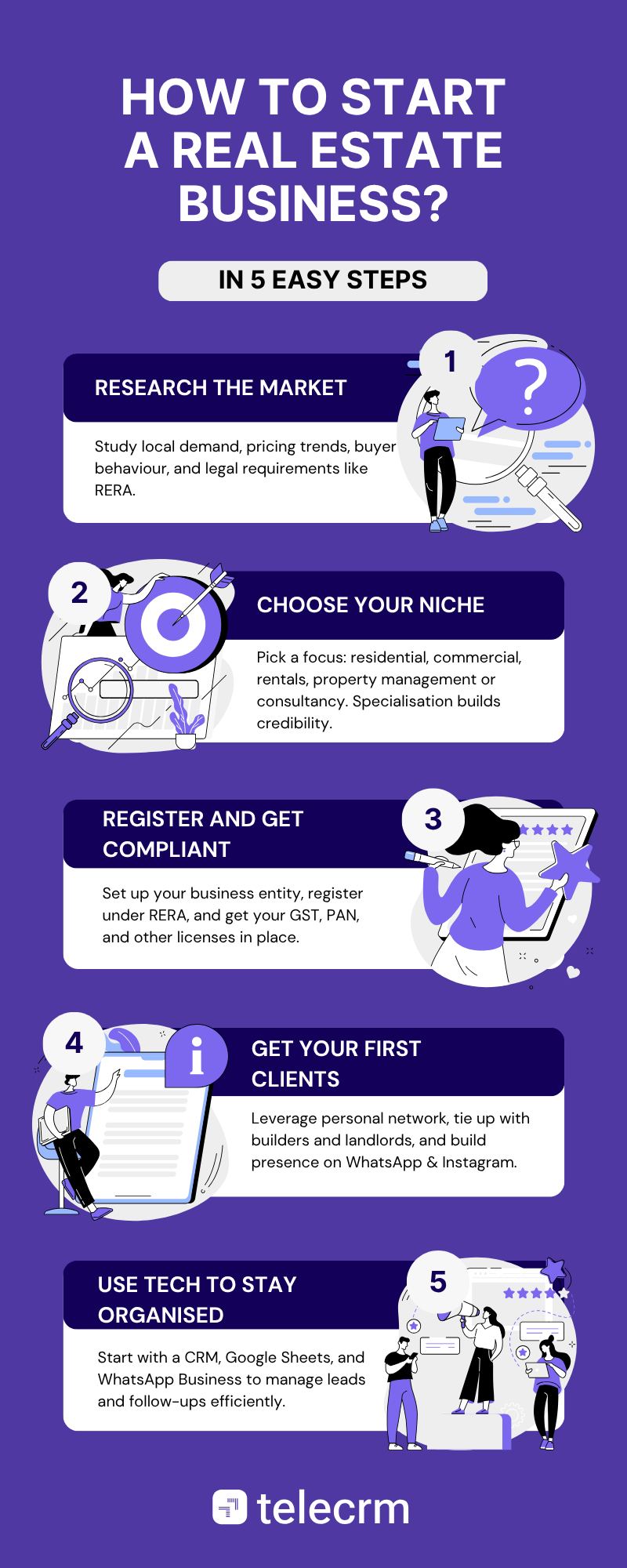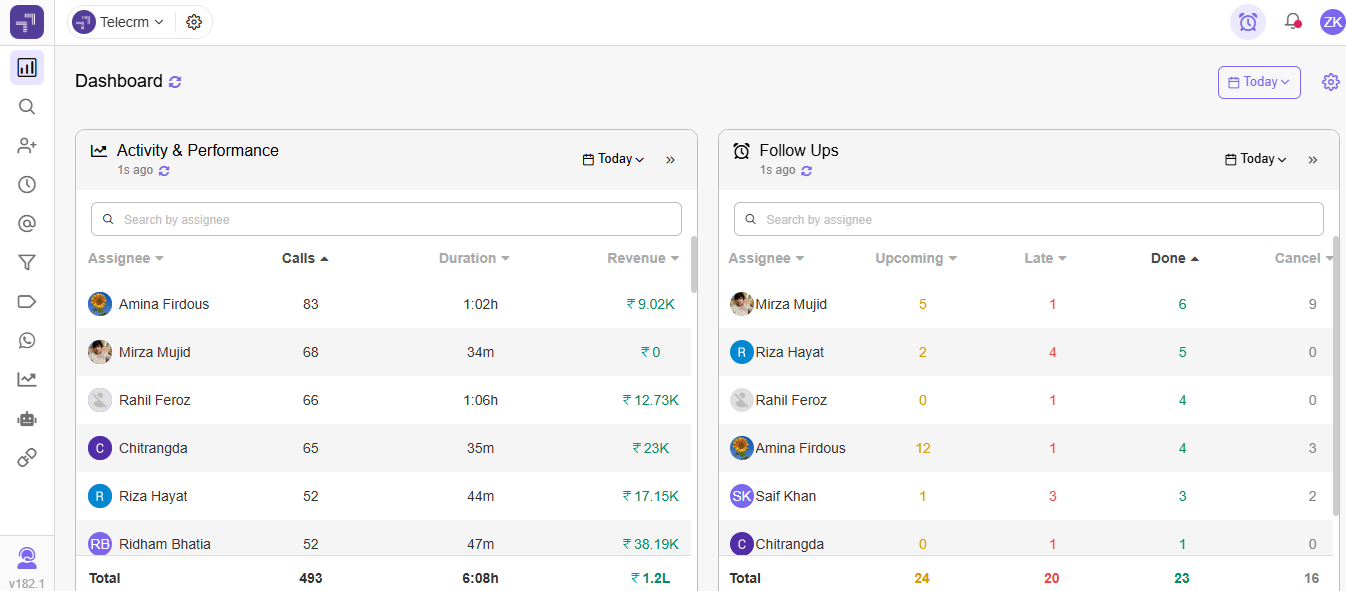
Starting a real estate business in India might sound like a big, complicated leap, especially when you’re looking at skyrocketing property prices, dozens of legal regulations and established players who seem to have it all figured out.
But here’s the good news: You don’t need crores of capital or years of industry experience to get started. What you do need is a clear roadmap, a little hustle and the ability to solve real problems for real people, like helping a family find their dream home or assisting an investor in spotting the next big location.
If you’ve ever thought, “yaar, real estate mein kuch karna hai,” but didn’t know where to begin, this guide is for you. We’ll walk you through the process, step by step, so you can start smart, avoid rookie mistakes and actually build something meaningful.
We have broken down the process of starting a real estate business into 5 simple and easy-to-follow steps. Follow these steps and start your real estate business in India in 2025!

You can’t win in real estate by just “going with your gut.” This is not a guessing game. If you want to succeed, the first step is understanding how the market works: what’s selling, who’s buying and where the real opportunities are.
Look around. Are people buying plots? Flats? Commercial spaces? Is there new construction happening? What are the popular areas and which ones are up-and-coming? A walk around your city with open eyes can reveal a lot.
Are you planning to work with first-time homebuyers, NRIs looking for investments, or maybe small businesses that want to rent office space? Each target group has different needs, budgets and ways of buying. Figure that out early.
Check what other agents or developers are doing — how they advertise, what projects they take on, what kind of customers they attract. Don’t just copy them, but understand what’s working and where you can do better.
One of the biggest mistakes new real estate entrepreneurs make? Trying to do it all.
Selling plots and flats and rentals and commercial spaces and luxury villas. The result? Confused messaging, scattered efforts and zero credibility.
Instead, start by picking one clear focus. A niche helps you become known for something, and that’s how people remember you and refer you.

Here are a few popular niches in India where you can own real estate business:
This is the most common and accessible starting point. As a broker, you act as the middleman between buyers and sellers or landlords and tenants. Your role is to connect the right people, manage site visits, negotiate deals and close transactions.
It’s fast-paced, low-investment and if you build a solid network, you can start earning commissions quickly.
This includes helping people buy or sell homes, flats, villas, plots, or builder floors. The market is huge, but so is the competition. What helps you win? Focusing on specific buyer segments (like first-time buyers or NRIs) or areas (like Noida Sector 150 or Baner in Pune).
This involves leasing or selling commercial properties like offices, shops, warehouses or coworking areas. B2B clients usually mean bigger deals, but also longer cycles and more paperwork.
Landlords who live in other cities often need someone to manage rent collection, maintenance and tenant issues. It’s recurring revenue and a growing market, especially in metros.
If you’re good with numbers and strategy, you can consult builders on pricing, go-to-market plans, or even manage the digital marketing for their project launches.
Okay, so you’ve picked your niche. Now let’s talk structure—because no matter how small you start, this is still a business. And if you want to scale, make profits, or even get builder tie-ups in the future, you need to have your backend sorted.
You can start as a sole proprietor if it’s just you. But if you’re planning to grow or raise funds later, consider setting up a Partnership, LLP or even a Private limited real estate company. You can even start as a real estate agent to first undertsand the ins and outs of the real estate business.
Each option has its own pros and cons in terms of taxes, liability and compliance.
No, you don’t need a 40-slide deck. But you do need answers to basic questions like:
Even a 1-page Notion doc or Excel sheet works. Just make sure your plan is real, not just in your head.

Let’s be real, just registering your real estate business doesn’t mean people will magically find you. Real estate market is a relationship-driven industry. You win clients when people trust you. And trust takes time, consistency and some smart moves.
Here’s how to get started:
Your first few deals will likely come from people you already know: friends, relatives, ex-colleagues, real estate broker, school contacts and real estate investors. Don’t hesitate to reach out. Drop a message saying you’re now in real estate, what kind of properties you’re dealing with and how you can help.
Even if they’re not buying right now, they might know someone who is.
If your niche is residential real estate, your buyers are probably scrolling Instagram and watching property videos on YouTube. If you’re into commercial leasing, they’re probably on LinkedIn.
So it’s important to use the right real estate marketing tools and to build your presence on the right platforms:

Pro Tip: In 2025, getting people’s attention in the most unique ways can get you clients without spending a hefty sum on advertisements. And that is exactly what you should focus on. Build awarenes through quirky and relatable adverts. Here are some creative real estate ad examples for you to take reference from.
Builders often need brokers to move their inventory faster. Same with landlords who have vacant flats or shops. Approach them with a clear pitch: what areas you cover, what kind of clients you can bring and how quickly you can close.
Once you’ve closed your first few deals and got some cash flow going, it’s time to shift gears. This is where most people get stuck: they’re doing everything themselves, working 14 hours a day, but not really growing.
Scaling doesn’t mean renting a fancy office or hiring a big team overnight. It means setting up systems so your business can grow without burning you out.
Once you’ve hit some consistency, bring in help, maybe a field executive who can manage site visits, or a telecaller to handle follow-ups. This frees you up to focus on growth.
Start slow. One good team member is better than three who don’t deliver.
Once you have a solid team of sales reps, get a real estate CRM (customer relationship management) like Telecrm, Zoho or LeadSquared to automate your sales processes and streamline site visits and follow-ups.
Which channel brings the most leads? Which area gives you the best margins? Where are you losing deals?
Use simple dashboards or tools to track this; data-driven growth is real, even in real estate.

Related Read: 9 Best Real Estate CRM in 2025 and Beyond!
Starting a successful real estate business in India can feel overwhelming at first. There’s competition, regulations and plenty of moving parts. But here’s the thing: it’s not rocket science.
If you take the time to understand your market, pick a clear niche, build trust with clients and stay consistent with your efforts, you will get results in the real estate industry.
The key is to treat it like a real business from day one. Have systems, use the right tools, talk to your clients like real people and deliver more than you promise.
The main categories in real estate are:
You can absolutely start with minimal investment. Begin by working as a freelance real estate agent or property consultant and even work under real estate professionals. Use free tools like WhatsApp and Google Sheets to manage your leads. Focus on building relationships and tying up with builders or landlords. You bring the clients, they provide the inventory and you earn commission on every deal.
Yes, but only if you treat it like a serious business. Real estate sector margins can be high, especially in resale, commercial and high-value residential deals. But consistency, networking and trust are key. Most agents don’t fail because of a lack of opportunity, they fail because of a lack of process and follow-up.
You can get started with as little as ₹5,000–₹10,000 if you’re going solo, mainly for your registrations, travel and basic marketing. But if you’re planning to set up an office, hire a team, or do your own project marketing, the budget could go up to ₹1–2 lakhs or more. Start lean. Grow as you earn.


© Copyright 2025 Telecrm.in - All Rights Reserved • Privacy Policy • T&C


© Copyright 2025 Telecrm.in - All Rights Reserved • Privacy Policy • T&C